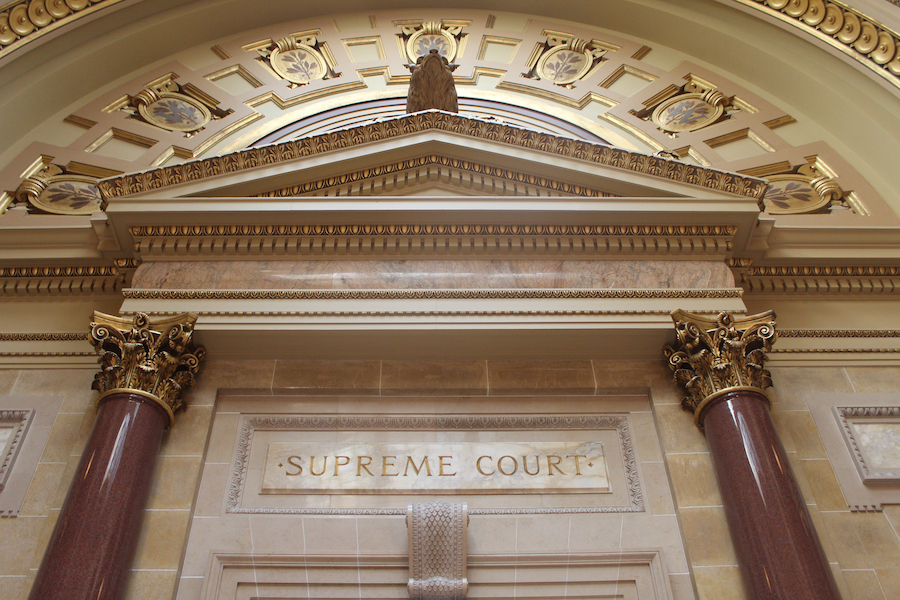SCOTUS Hears Oral Arguments in Four Cases

When U.S. Supreme Court heard oral arguments in four cases last week, it was missing hospitalized Justice Clarence Thomas. The issues before the Court included challenges to North Carolina’s voter ID law, the waiver of arbitration agreements, and international child custody disputes.
Below is a brief summary of the issues before the Court:
Berger v. North Carolina State Conference of the NAACP: The case involves a legal challenge to North Carolina’s voter-identification law, specifically whether two Republican members of the North Carolina legislatureshould be able to intervene in the suit. The justices have agreed to consider the following three issues:(1) Whether a state agent authorized by state law to defend the state’s interest in litigation must overcome a presumption of adequate representation to intervene as of right in a case in which a state official is a defendant; (2) whether a district court’s determination of adequate representation in ruling on a motion to intervene as of right is reviewed de novo or for abuse of discretion; and (3) whether petitioners Philip Berger, the president pro tempore of the state senate, and Timothy Moore, the speaker of the state house of representatives, are entitled to intervene as of right in this litigation.
Morgan v. Sundance, Inc.: The case seeks to resolve a circuit split over whether prejudice is an essential element of proving waiver of the right to arbitrate. The specific question before the Court is: Does the arbitration-specific requirement that the proponent of a contractual waiver defense prove prejudice violate this Court’s instruction in AT&T Mobility LLC v. Concepcion, 563 U.S. 333, 339 (2011) that lower courts must “place arbitration agreements on an equal footing with other contracts?”
Golan v. Saada: The case involves international child custody disputes.The Hague Convention on the Civil Aspects of International Child Abduction requires return of a child to his or her country of habitual residence unless there is a grave risk that his or her return would expose the child to physical or psychological harm. The question the justices must decide is: “Whether, upon finding that return to the country of habitual residence places a child at grave risk, a district court is required to consider ameliorative measures that would facilitate the return of the child notwithstanding the grave risk finding.”
ZF Automotive US, Inc. v. Luxshare, Ltd.: The case, which is consolidated with Servotronics, Inc. v. Rolls-Royce PLC, addresses the scope of 28 U.S.C. § 1782, which allow a U.S. district court to order a person who “resides or is found” in its jurisdiction to provide document discovery or deposition “for use in a proceeding in a foreign or international tribunal.”The specific question before the Courtis: Whether28 U.S.C. § 1782(a), which permits litigants to invoke the authority of United States courts to render assistance in gathering evidence for use in “a foreign or international tribunal,” encompasses private commercial arbitral tribunals, as the U.S. Courts of Appeals for the 4th and 6th Circuits have held, or excludes such tribunals, as the U.S. Courts of Appeals for the 2nd, 5th and 7th Circuits have held.
Decisions in all of the cases are expected before the Court’s term ends in June. Please check back for updates.
Previous Articles
SCOTUS Wraps Up Oral Arguments for the Term
by DONALD SCARINCI on May 17, 2022
The U.S. Supreme Court has concluded its oral arguments for the October 2021 Term. The justices hea...
SCOTUS Rules Censure of Elected Board Member Didn’t Violate First Amendment
by DONALD SCARINCI on May 10, 2022
In Houston Community College System v. Wilson, 595 U.S. ____ (2022), the U.S. Supreme Court held th...
Supreme Court Breach Is Not the First Involving Roe v. Wade
by DONALD SCARINCI on
The recent disclosure of Justice Samuel Alito’s decision purporting to overturn Roe v. Wade is ar...
The Amendments
-
Amendment1
- Establishment ClauseFree Exercise Clause
- Freedom of Speech
- Freedoms of Press
- Freedom of Assembly, and Petitition
-
Amendment2
- The Right to Bear Arms
-
Amendment4
- Unreasonable Searches and Seizures
-
Amendment5
- Due Process
- Eminent Domain
- Rights of Criminal Defendants
Preamble to the Bill of Rights
Congress of the United States begun and held at the City of New-York, on Wednesday the fourth of March, one thousand seven hundred and eighty nine.
THE Conventions of a number of the States, having at the time of their adopting the Constitution, expressed a desire, in order to prevent misconstruction or abuse of its powers, that further declaratory and restrictive clauses should be added: And as extending the ground of public confidence in the Government, will best ensure the beneficent ends of its institution.




